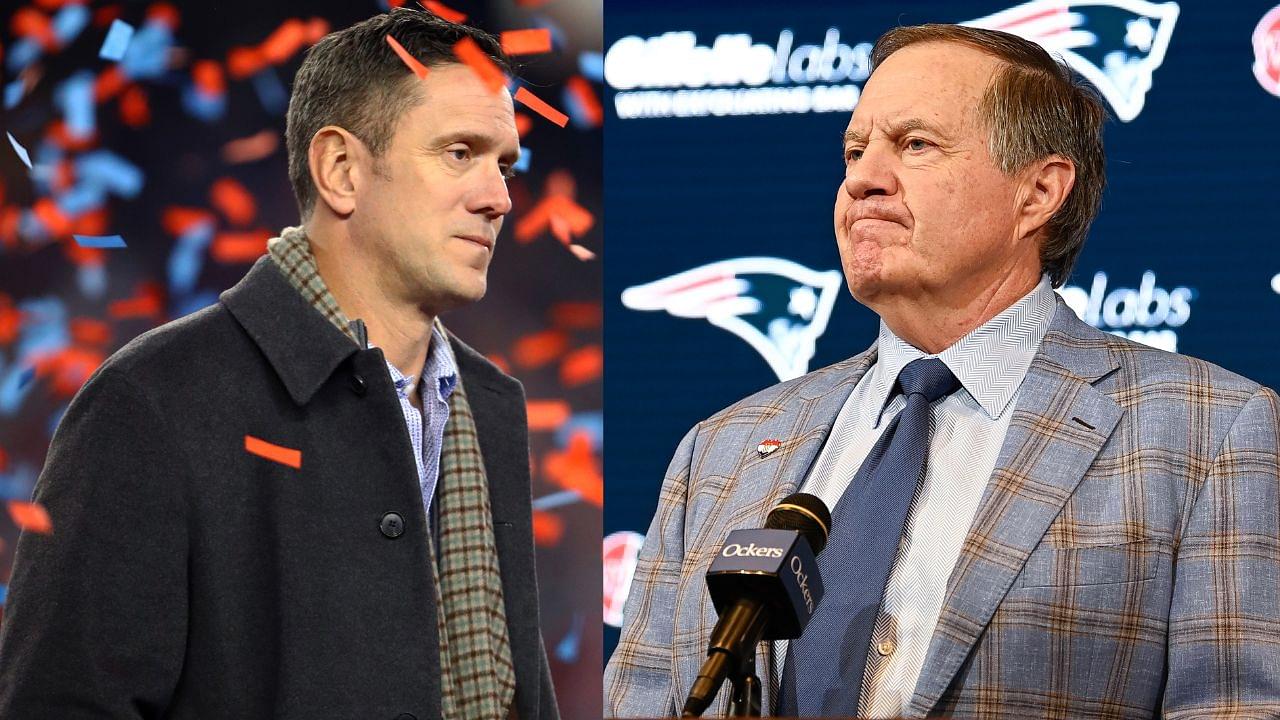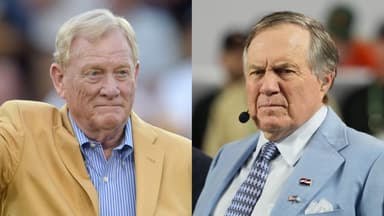When Drew Bledsoe took over the helm in New England in 1993 and led the team to the playoffs the following year, breaking a seven-season-long drought, it seemed like the Patriots finally had some breathing room. But despite three more appearances in the postseason, the Washington State alum simply failed to lead the club to the promised land. Then came Bill Belichick into the picture, who in his second season with Bledsoe, had no choice but to bench him after a botched hit on the chest that almost killed him. And the rest, as they say, is history. The head man would go on to have an illustrious run alongside Tom Brady, but Bledsoe would hang up his cleats after five unimpressive seasons, split between the Buffaloes and the Cowboys. Two decades after the incident that sparked it all, former Patriots exec Ernie Adams finally voices his two cents about how cold the NFL business can be and how Belichick is now exactly where he left Bledsoe in 2001.
Advertisement
On the ‘Games With Names‘ podcast, former football research director for the Patriots, Ernie Adams, recalled the cannon event in 2001 that would eventually evolve into the Patriots Dynasty. And it all started with Drew Bledsoe getting injured during the Patriots’ Week 2 loss against the Jets. The botched hit from linebacker Mo Lewis left the star QB in critical condition, and it was clear that he wasn’t going to lead the game next week against the Colts. Or anytime soon.
The 2001 fourth-string QB, Tom Brady, secured the starting job, and his predecessor, before the visit to Indianapolis, couldn’t believe that he was being left behind. But the show must go on, and the sentiment in Foxborough wasn’t much different, as Ernie recalled:
“You lose Drew Bledsoe, and you know what? Bill, everybody thinks — we got a game next week. We don’t have three days wallowing around feeling sorry for ourselves.“
The former exec, however, couldn’t help but feel sorry about how the NFL is a “cold business.” He talked about Bledsoe’s unfortunate injury, which led to his departure from the team — a team that he led for almost a decade. And now, it’s a full circle, as Belichick is also going into the 2024 season without being able to call the Patriots home after a 24-year run.
“I mean, in a way, it’s a cold business, where, particularly if you’re a player that gets hurt, and you (think) you know what, they’re going without me,” Ernie expressed. “(What goes around comes around) and it’s going to hit Bill the opening day next season.“
Despite the setback, the Patriots went on to win their first big one that season. Ernie even reminisced about the team’s second regular-season matchup against the Colts, where the play-caller couldn’t believe what was happening on the field. After wideout David Patten’s dominance, the commentator had quipped, “Who are these guys?” Ernie believes they started the dynasty as nobodies, just like the play-caller said, and no one can claim it could have happened without Belichick.
Bill Belichick and Ernie Adams Knew Each Other for More Than 50 Years
During the same interview, host Julian Edelman interestingly posed a question to Ernie about when he and Belichick first met. The former Patriots exec labeled it a ‘famous story’, before recalling having to read Bill’s father, Steve Belichick’s book — Football Scouting Methods. And as luck would have it, Bill would stumble upon the same school Ernie was going to for four years. After getting to read the godfather of the Naval Academy of Football’s book, Ernie couldn’t just forget the Belichick name and when he saw Bill coming to practice with his last name taped on the forehead, Earnie had to ask.
He built the courage to go and ask Bill if he was related to the legendary Steve Belichick, and one could say the interaction didn’t go as planned. Earnie expressed, “Bill looks at me like, ‘You gotta be kidding me.’” But the duo soon made up and would meet again in New York when Ernie became an offensive assistant and Belichick — a special team and defensive assistant. Although they split up in 1981, the duo would briefly meet again in Cleveland and then finally in New England.








